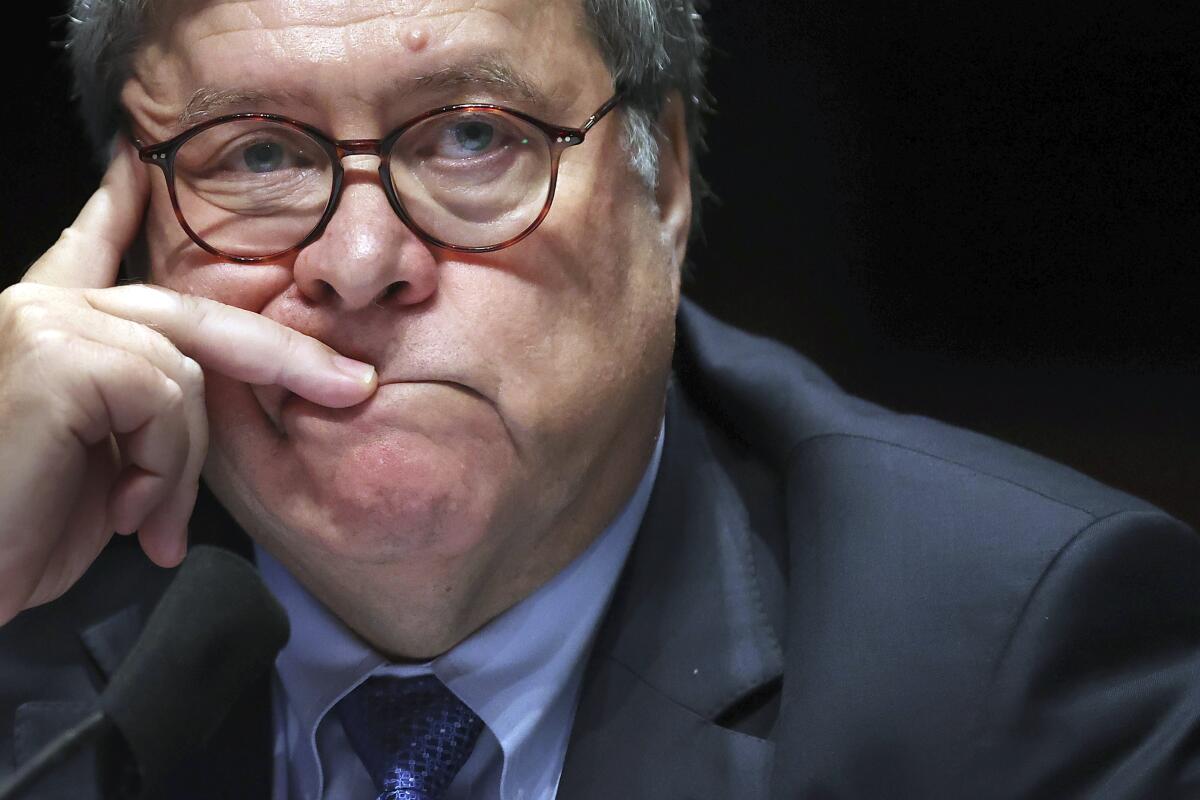Column: William Barr is a danger to democracy. He channels what the president wants

- Share via
Atty. Gen. William Barr left us with a terrifying certainty in the wake of his testimony Tuesday in front of the House Judiciary Committee: Under him, the Department of Justice stands ready to advance any pro-Trump policy, justifying it on the basis of a blinkered, tenuous view of the facts and the law, or maybe just Barr’s personal ideological intuitions.
For all its finger-wagging, the Judiciary Committee is not in a position to constrain the attorney general. There is no real brake on Barr’s conduct short of a Trump loss in November. Or, to adopt Barr’s own unsettling gloss, a Trump loss that is sufficiently “clear” that he and his boss would accept it.
For the record:
4:30 p.m. July 31, 2020This op-ed article misstates the result of Robert S. Mueller III’s investigation. It resulted in 37 indictments, not 37 convictions.
Since the hearing, commentators have seized on a couple of blows that Democrats on the Judiciary Committee — Reps. Eric Swalwell (D-Dublin) and Pramila Jayapal (D-Wash.) primarily — landed on the attorney general. But there was nothing close to a knockdown, and the hard facts remain: The House will not impeach Barr and President Trump will continue to give him full rein.
Atty. Gen. William Barr defends the aggressive federal law-enforcement response to protests, including in Portland, Ore.
It’s no secret that the Democrats in Congress (and more than half of the country) view Barr as Mephistopheles — dishonest, partisan, corrupt, even racist. He did nothing Tuesday to try to revise that view; in fact, he seemed indifferent to it.
Norms of evenhandedness, professionalism and especially political disinterest, which traditionally check U.S. attorneys general, do not moderate his conduct. He championed every partisan act his DOJ has taken on the president’s behalf, blandly claiming they reflected the faithful application of the rule of law.
For example, when he defended the highly unusual deployment of federal agents in Portland, Ore., Barr described a “Batman”-like dystopia in which a few U.S. marshals were beset night after night by a marauding horde of uncontrollable professional anarchists. If that were accurate, it would be hard to quibble with sending in the feds.
But the justification dries up immediately if the protests were, as a lot of the reporting on the ground indicates, largely peaceful, and if local law enforcement were capable of defending the Portland federal courthouse and separating lawbreakers from peaceful protestors. (The announcement Wednesday that the Department of Homeland Security’s mystery troops were withdrawing suggests the argument for the invasion was tenuous all along.)
Or consider Barr’s legally tortured defense of the president’s memo attempting to exclude immigrants who are in the U.S. illegally from the 2020 census. The plain language of the 14th Amendment, as well as a unanimous opinion of the Supreme Court, leaves no room for argument: Everyone who “inhabits” the U.S. must be counted.
But Barr claims that Congress has delegated to the Commerce Department an ability to advance an Orwellian definition of “inhabitant.” He called it an “arguable position.” It isn’t arguable; it’s wrong.
And given that it is the attorney general’s job to uphold the law of the land, he shouldn’t even bring up the theory, regardless of the half- or quarter-baked views of the president.
Barr’s partisan proclamations went on and on, with this whopper as a high point: “From my experience, the president has played a role properly and traditionally played by presidents.”
The most chilling aspect of the hearing, however, was Barr’s refusal to rule out applying the same politicized approach to pivotal issues related to the election, now fewer than 100 days away.
He reiterated his claim — with no support other than his own “common sense” — that mail-in voting threatens widespread fraud. If the Justice Department goes to battle in support of this view, it could provide a deeply unfair advantage to Trump, given that voting by mail increases turnout and increased turnout helps Democratic candidates.
More ominously yet, Barr made it clear he had no compunction about releasing the report he has ordered up from U.S. Atty. John Durham on the beginnings of the Robert S. Mueller III probe, an investigation Barr has already termed “bogus,” even though it produced 37 convictions and an unquestioned body of evidence showing that Team Trump engaged in obstruction of justice.
It’s entirely plausible that Barr would time the release of Durham’s report for maximum impact on the election. That would be a straightforward violation of DOJ policy, which specifies that the department “may never select the timing of investigative steps or criminal charges for the purpose of affecting any election,” but Barr has a novel interpretation of those words: The policy is inapplicable if such actions aren’t directed at a particular candidate. That reading doesn’t hold water.
In front of the Judiciary Committee, the attorney general insisted repeatedly that he doesn’t speak to the president, much less take orders, about how to resolve individual cases. But Barr’s performance demonstrated how little that matters. He knows what Trump wants and needs — no memo or Oval Office discussion required. That’s what makes him so valuable to Trump, and so dangerous to democracy.
More to Read
A cure for the common opinion
Get thought-provoking perspectives with our weekly newsletter.
You may occasionally receive promotional content from the Los Angeles Times.










